Related Research Articles
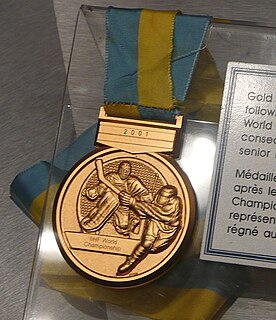
The Ice Hockey World Championships are an annual international men's ice hockey tournament organized by the International Ice Hockey Federation (IIHF). First officially held at the 1920 Summer Olympics, it is the sport's highest profile annual international tournament. The IIHF was created in 1908 while the European Championships, the precursor to the World Championships, were first held in 1910. The tournament held at the 1920 Summer Olympics is recognized as the first Ice Hockey World Championship. From 1920 to 1968, the Olympic hockey tournament was also considered the World Championship for that year.
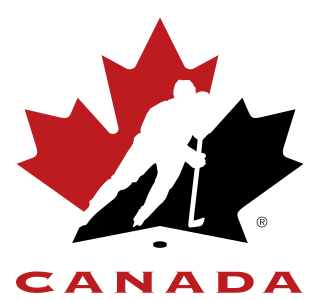
Hockey Canada, which merged with the Canadian Amateur Hockey Association in 1994, is the national governing body of ice hockey and ice sledge hockey in Canada. It is a member of the International Ice Hockey Federation and controls the majority of organized ice hockey in Canada. There are some notable exceptions, such as the Canadian Hockey League, U Sports, and Canada's professional hockey clubs; the former two are partnered with Hockey Canada but are not member organizations. Hockey Canada is based in Calgary, with a secondary office in Ottawa and regional centres in Toronto, Winnipeg and Montreal.
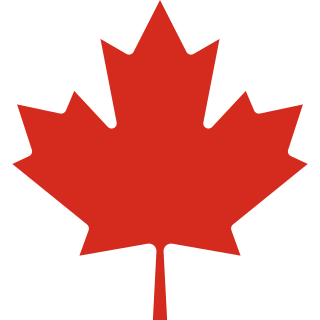
The Canada men's national ice hockey team is the ice hockey team representing Canada internationally. The team is overseen by Hockey Canada, a member of the International Ice Hockey Federation. From 1920 until 1963, Canada's international representation was by senior amateur club teams. Canada's national men's team was founded in 1963 by Father David Bauer as a part of the Canadian Amateur Hockey Association, playing out of the University of British Columbia. The nickname "Team Canada" was first used for the 1972 Summit Series and has been frequently used to refer to both the Canadian national men's and women's teams ever since.

The Czech men's national ice hockey team is the national ice hockey team of the Czech Republic. It is one of the most successful national ice hockey teams in the world and a member of the so-called "Big Six", the unofficial group of the six strongest men's ice hockey nations, along with Canada, Finland, Russia, Sweden and the United States. It is governed by the Czech Ice Hockey Association. The Czech Republic has 72,075 players officially enrolled in organized hockey.

The Russian men's national ice hockey team is the national men's ice hockey team of Russia, overseen by the Ice Hockey Federation of Russia. As of 2021, they are rated third in the IIHF World Ranking. The team has been competing internationally since 1992 and is recognized by the IIHF as the successor to the Soviet Union team and CIS team. Russia is one of the most successful national ice hockey teams in the world and a member of the so-called "Big Six," the unofficial group of the six strongest men's ice hockey nations, along with Canada, the Czech Republic, Finland, Sweden and the United States. The European nations of the Big Six participate in the Euro Hockey Tour, which Russia won nine times since 2005. Since September 2021, the head coach is Alexei Zhamnov, taking over after Valeri Bragin.

The German men's national ice hockey team first participated in serious international competition at the 1911 European Hockey Championship. When Germany was split after World War II, a separate East Germany national ice hockey team existed until 1990. By 1991, the East German teams and players were merged into the German Ice Hockey Federation.
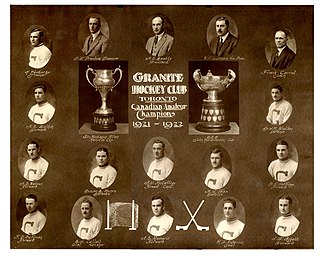
The Toronto Granites were an amateur senior ice hockey team from Toronto, Ontario. The Granites were Allan Cup champions in 1922 and 1923. They were chosen to represent Canada at the 1924 Winter Olympics in Chamonix, France. The Granites won the second consecutive Olympic gold medal for the Canada national men's ice hockey team.

The Soviet national ice hockey team was the national ice hockey team of the Soviet Union. The team won nearly every world championship and Olympic tournament between 1954 and 1991 and never failed to medal in any International Ice Hockey Federation (IIHF) tournament they competed in.
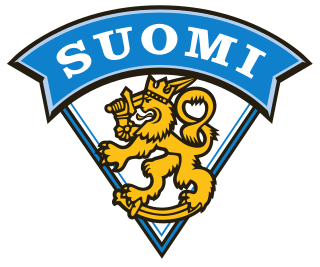
The Finnish women's national ice hockey team represents Finland at the International Ice Hockey Federation (IIHF) World Women's Championships, the Olympic Games, the Four Nations Cup, and other international-level women's ice hockey competitions. The women's national team is overseen by the Finnish Ice Hockey Association. Finland's national women's program is ranked third in the world by the IIHF and has 5,858 active players as of 2019.
The men's ice hockey tournament at the 1964 Winter Olympics in Innsbruck, Austria, was the 10th Olympic Championship, also serving as the 31st World Championships and the 42nd European Championships. The games were held at the Olympiahalle Innsbruck.

Ice hockey tournaments have been staged at the Olympic Games since 1920. The men's tournament was introduced at the 1920 Summer Olympics and was transferred permanently to the Winter Olympic Games program in 1924, in France. The women's tournament was first held at the 1998 Winter Olympics.

The Triple Gold Club is the group of ice hockey players and coaches who have won an Olympic Games gold medal, a World Championship gold medal, and the Stanley Cup, the championship trophy of the National Hockey League (NHL). The International Ice Hockey Federation (IIHF) considers them to be "the three most important championships available to the sport".
The 1930 Ice Hockey World Championships were held between January 30 and February 10, 1930, in Chamonix, France, Vienna, Austria, and Berlin, Germany. This event was the first world championships independent of hockey at the Olympics.
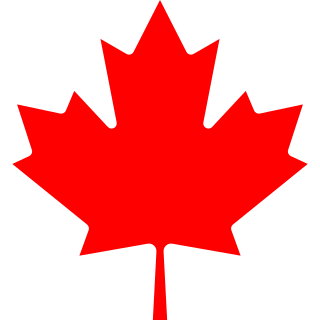
The Canadian men's national under-20 ice hockey team is the ice hockey team representing Canada internationally in under-20 competition. Their primary participation in this age group comes at the International Ice Hockey Federation's World Junior Championship, held annually every December and January. The team also participates in various exhibition matches and occasional exhibition series, such as the 2007 Super Series against their Russian counterparts, an eight-game exhibition series commemorating the 35th anniversary of the 1972 Summit Series.

The Toronto Varsity Blues men's ice hockey team is an ice hockey team operated by the Varsity Blues athletics program of the University of Toronto. They are members of the Ontario University Athletics conference and compete in U Sports. The Varsity Blues senior team won the Allan Cup in 1921 and 1927, and won the gold medal for Canada at the 1928 Winter Olympics. The team is based at Varsity Arena on the University downtown campus in Toronto, Ontario.
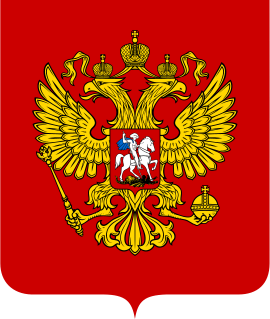
The Russian men's national under 20 ice hockey team is the national under-20 ice hockey team in Russia. The team represents Russia at the International Ice Hockey Federation's World Junior Hockey Championship, held annually every December and January.
The Toronto National Sea Fleas were a senior men's amateur ice hockey team that won the 1932 Allan Cup, and also represented Canada at the 1933 World Ice Hockey Championships held in Prague, Czechoslovakia where the team lost the final game to the United States in overtime to capture the silver medal for Canada.
The 1932 Allan Cup was won by the Toronto National Sea Fleas. This team went on to represent Canada at the 1933 World Ice Hockey Championships held in Prague, Czechoslovakia where the team lost the final game to the United States in overtime to capture the silver medal for Canada.

The 1920 Allan Cup was the senior ice hockey championship of the Canadian Amateur Hockey Association (CAHA) for the 1919–20 season.
References
- 1 2 Holland, Dave (2008). Canada on Ice; The World Hockey Championships, 1920 – 2008. Canada On Ice productions. pp. 30–31. ISBN 978-0-9808936-0-1.